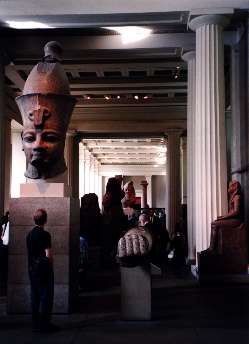Museum
|
|
A museum is typically a non-profit, permanent institution in the service of society and of its development, open to the public, which acquires, conserves, researches, communicates and exhibits, for purposes of study, education enjoyment, the tangible and intangible evidence of people and their environment." This definition is taken from the International Council of Museums (ICOM) Statutes, article 2, para. 1, and is regularly reviewed and modified at the triennial ICOM General Assemblies, most recently in Barcelona in 2001. The italicized tangible and intangible was substituted for the previous material at the triennial General Assembly in Seoul in 2004, pending ratification at the next General Assembly in 2007. (The new wording was introduced in the revised ICOM Code of Ethics for Museums, which is another of the museum profession's core normative instruments.)
Modern museums concentrate on a particular subject, and most museums belong to one or more of the following categories: fine arts, applied arts, archaeology, anthropology, ethnology, history, cultural history, science, technology, natural history. Within these categories many museums specialize further, e.g. museums of modern art, local history, aviation history, ariculture or geology.
Open air museums collect and reerect old buildings at large out-door sites, usually in settings of re-created landscapes of the past. The first one was King Oscar II's collection near Oslo in Norway, opened in 1881. In 1891 Arthur Hazelius founded the famous Skansen in Stockholm, which became the model for subsequent open air museums in Northern and Eastern Europe, and eventually in other parts of the world. Most open air museums are located in regions where wooden architecture prevail, as wooden structures may be translocated without substantial loss of authenticity. A more recent but related idea is realized in the ecomuseums, which originated in France.
Early museums began as princely collections of art and rare or curious natural objects and artefacts.

Museums are usually open to the general public for a fee. Some museums have free entrance, either permanently or on special days, e.g. once per week or year.
The museum is usually run by a curator, who has a staff that cares for the objects and arranges their display. Many museums have associated research institutes, which are frequently involved with studies related to the museum's items.
Either the museum itself or an associated institute may organize expeditions to acquire more items or documentation for the museum.
Museums may also acquire items through donations, sales or trades. For instance, a museum featuring Impressionist art may receive a donation of a Cubist work which simply cannot be fit into the museum's exhibits, but it can be used to help acquire a more relevant painting. Larger museums will have an "Acquisitions Department" whose staff is engaged fulltime in this kind of activity.
Museums often cooperate to sponsor joint and often traveling exhibits on particular subjects where one museum may not have a sufficient collection or where the greatest works on a subject are collected. These exhibits have limited engagements and often require an additional entry fee.
The word comes from the Latin museum, which is in turn derived from the Greek mouseion, which refers to a place or temple dedicated to the Muses, the patron divinities in Greek mythology of the arts.
Museum designers
Notable international museum designers include Ralph Appelbaum and Edwin Schlossberg.
See also
- The Muses of the Enlightenment,
- Art museum,
- List of museums,
- List of transport museums,
- Maritime museum,
- Science museum,
- Open air museum,
- Wax museum,
External links
- MOLLI (http://www.molli.org.uk/) (MOLLI:Museum on-line learning initiatives)
- Virtual Library museums pages (http://vlmp.museophile.com) (VLmp)
- International Council of Museums (http://icom.museum/) (ICOM)
- The .museum top-level domain (http://about.museum/) (Dot-museum)
- Great Museums in the World (http://www.insecula.com/) (Louvre, Metropolitan Museum, MoMA, Picasso …)
- Schulmuseen in Europa (http://schulmuseum.net/)
- EVE (http://www.billdouglas.org/eve/)(A democratice e-museum: orientated around end users creating their own interpretation)
- Museums in Greece (http://www.greece-museums.com)bg:Музей
bn:যাদুঘর da:Museum de:Museum et:Muuseum es:Museo eo:Muzeo fr:Musée id:Museum it:Museo hu:Múzeum ms:Muzium nl:Museum ja:博物館 no:Museum pl:Muzeum pt:Museu ru:Музей fi:Museo sv:Museum zh:博物馆
